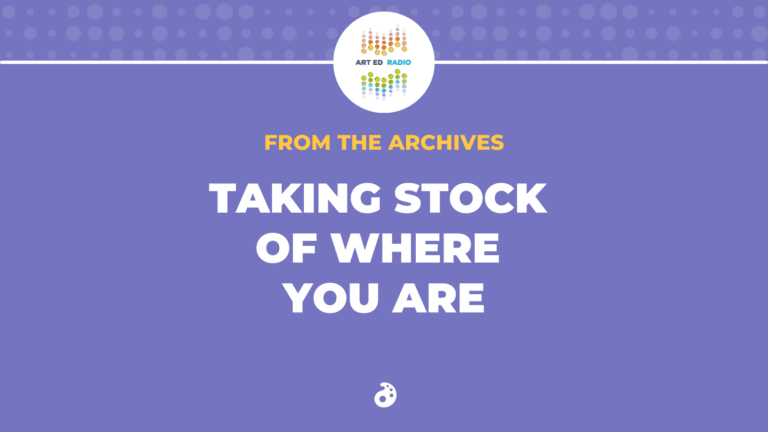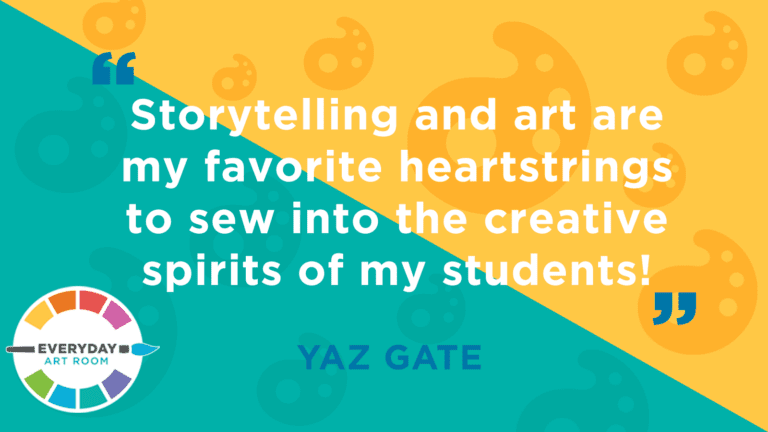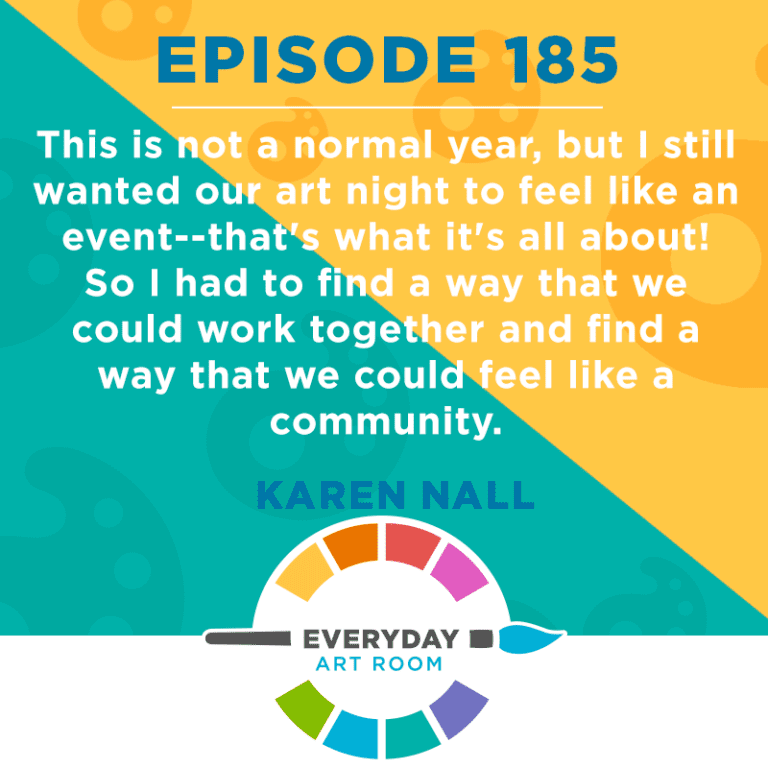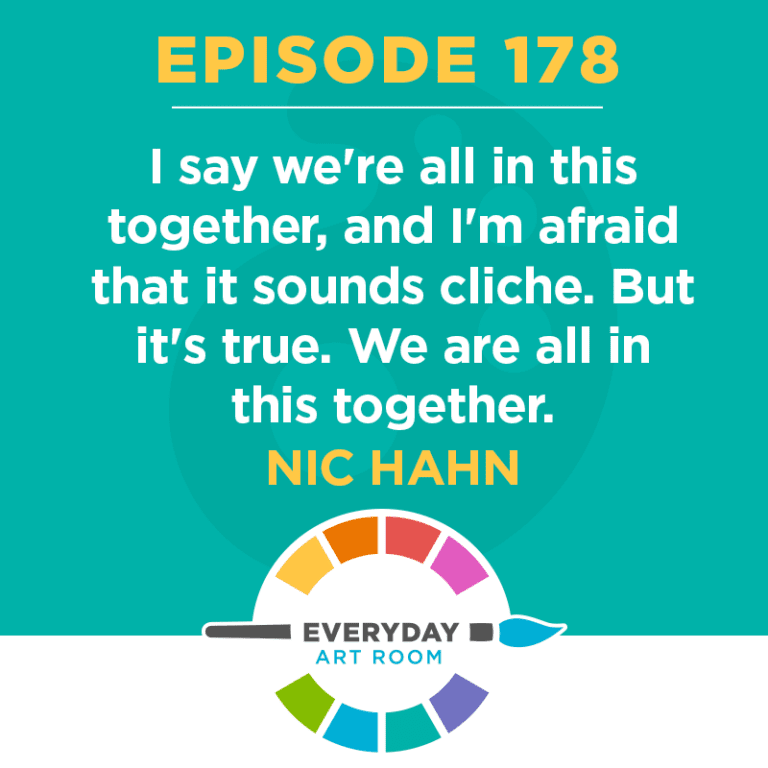No matter where we are in life, or what we have accomplished, it always seems like we are looking for something more. How do we appreciate what we have at this moment? AOE Founder and President Jessica Balsley joins Tim to discuss the seasons of your life, the myth of the work-life balance, and how one bad day can’t define you as a person or a teacher. Full episode transcript below.
Resources and Links
- Talking Passion and Creativity with Jessica Balsley
- Continuing to Learn in Every Season of Your Life
- Finding Your Sweet Spot at Home and Work
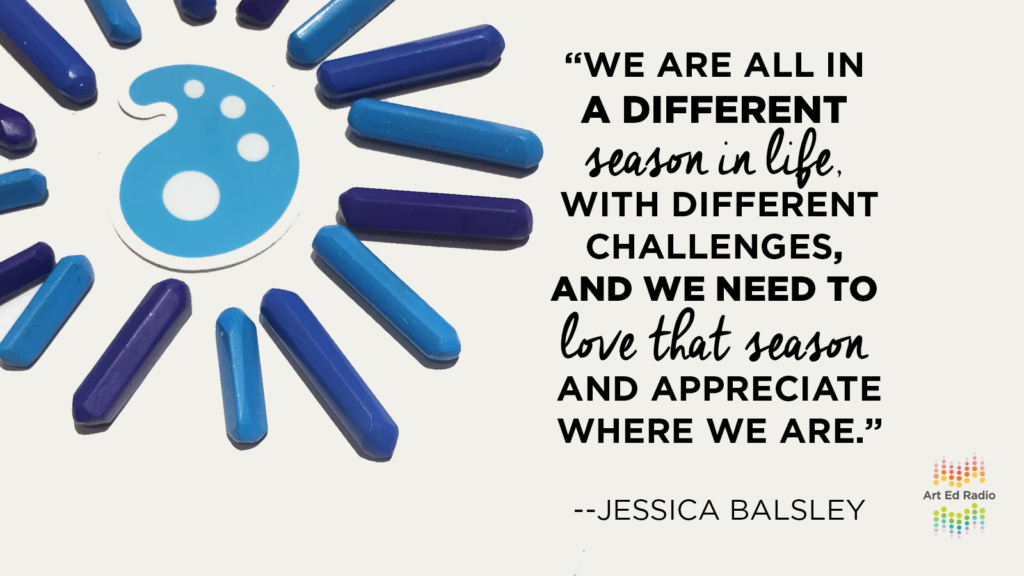
Transcript
Tim: Welcome to Art Ed Radio, the podcast for art teachers. This show is produced by the Art of Education, and I’m your host, Tim Bogatz.
All right guys, I have a very exciting podcast coming, today. I finally talked my boss into showing up on the episode, so I am here at AOE headquarters with Jessica Balsley, founder and president of AOE. Jessica, how are you?
Jessica: Hey, Tim. I’m doing great. Lovely to have you visiting.
Tim: Thank you. I’m excited to be here, and I’m excited you finally decided to come back on the pod- … I feel like once every like, six months, I can get you on the podcast.
Jessica: It’s all good.
Tim: And I always appreciate it. So you know, I just wanted to talk a lot about the ideas that you have as far as work-life balance and kind of how we handle everything that’s always on our plates, how we keep from getting too busy, getting too overwhelmed, and I guess what I want to start with, you know, is just like sitting here in your office, I see your framed picture that you have that says, “Love your season,” on there, and I remember the first time I saw that, I was like, “What is this thing?” I had no idea. So can you kind of explain to everybody, you know, what that saying, that, “Love your season,” means, and why you think it’s so important?
Jessica: Yeah, sure. Well, first of all, I never thought that something I was doing on the side for fun to help art teachers would turn into something that has 40+ team members and impacting thousands of art teachers, and so, not being able to predict that, I also wasn’t able to predict what season of life I would be in when I was also doing professional life things, having family things go on, and how those all combine to be the perfect storm, if you let it, and so really, we all are in a different season of life. We might be caring for young children. We might be figuring out what we want to do with our lives. We might be caring for elderly parents. And each season comes with its own set of baggage, its own set of things that can be challenging with it, and sometimes, we just wish to be in the next season. “If only I wasn’t in this season, this would be easier,” and instead, it’s just love the season you’re in. Embrace it and do your best to navigate it how you can.
We always perceive that everyone else is just doing perfectly in their season, but that’s not the case. Someone said to me, “I perceive you doing yoga every morning,” and that is not the case. I am wiping snotty noses and you know, late to work, and running around, and that’s just … that is life, and so, if we can embrace that, I think that’s what, “Love your season” is really all about for me.
Tim: Yeah, and I think that mindset is so important because you know, on those difficult days, you always find yourself going, “Oh, if I didn’t have to take my kids here, I’d have time to do this,” and, “If I didn’t have to do A, I wouldn’t have to worry about B,” but you just need to slow down and kind of embrace, yeah, where you are, and enjoy the time you have with your kids, or enjoy whatever else may be coming at you, and I guess, kind of related to that, too, I wanted to talk about work/life balance, ’cause I feel like we always hear that advice, and we should always strive for having a work/life balance, but I know you don’t agree with that, and I remember you hearing a talk about, you know, how work/life, finding a balance at it is just a myth, and it really kinda got me thinking, so can you talk about, I guess, why we need to embrace work rather than trying to fight it all the time?
Jessica: Sure, and this really applies to any profession, whether you’re an educator and you have summers off, or really busy in the school year, or no matter a spouse or anyone else, no matter what the profession, it exists, and I think that all of it is just life. There really isn’t always a balance on a daily basis, and that we always kind of say work is the enemy of the rest, and it’s like, I would be more balanced if I didn’t have as much work, and I feel like that’s negative towards work, and really, work gives you purpose. Work makes you happy. You would not be who you are without your profession as an art teacher, and so, it’s always hard to pit those against your family, ’cause your family’s always going to win, right? And so, what’s helped me is to realize that one day of imbalance doesn’t define you or your year.
It’s about the sum of its parts, so you might have one day where you’re putting up an art show, and you don’t even see your family, or you don’t even make it home and eat supper, but then the next day, maybe you have a day off, and it’s all about catching up on home things, and over time, those things add up to be the sum of the parts, and it is balanced over time. It just doesn’t have to be … every day isn’t a perfect day. And that’s helped me get through the days where you feel imbalanced one way or the other, and if you have a perfect day, hurray. Embrace it. It’s a good thing. Don’t question it.
Tim: Yeah, and absolutely, you need to celebrate that, and I actually wanted to ask you about you know, what you were just talking about with one day is not gonna define you, and I remember having a conversation with you about that, and I really appreciated it because it was one of those days where it was just terrible, and I couldn’t handle cooking that night, and I ordered pizza for my kids, and you know, you just, you start to feel guilty about that. Like, “Oh, you know, I’m not doing this right. I’m struggling,” and you can really get down on yourself, but you know, you really kind of made me realize that we do need to look more at the big picture and not just focus in on that day, you know, when we’re not at our best, so I guess, can you expand on that a little bit more, and just kinda talk about how, or give suggestions about how we can look at the big picture rather than just dwelling on those bad days?
Jessica: Sure. One thing that has helped me a lot is thinking about over time, what do I want my family to remember me for? Over time, what do I want my career goals to be? And knowing that those aren’t gonna happen in a day, and so one thing that I do is pick some non-negotiables, which are items that really, I’m not gonna budge on if I can help it because they’re that important, and they’re always the priority, and then other thing … that helps shape the day, so an example of one of my non-negotiables is I want to be the person to drop off my kids to school and pick them up, every day, and it’s not every day. The day of the Art Ed Now conference, I am probably not doing that, or the day that I’m traveling to a conference, I’m not doing that, but on a normal, average day, I want to generally be the one to pick up my kids, and that helps shape my schedule. It shapes my philosophy. It helps with the guilt, and that brings my … if anything, it just brings me ease, so that’s one example of one of my non-negotiables.
You know, another is dinner on the table for my family comes before outside things if I can help it, so if I can’t even get dinner on the table, I’m not gonna volunteer at the school, especially if it’s a busy season of work, so some of those things are what guide me, and it helps just add a little structure to what seems chaotic.
Tim: Yeah, absolutely, and I want to talk about that chaos, too, but I was just gonna say, ’cause I think non-negotiables are important, and I think everybody needs to kind of think about what they are in their own life. Like for me, you know, I pick up my kids at 3:30 and hang out with them until they go to bed at 8:30, and you know, just during that time, I try not to worry about work. I try to, sort of, be out of contact and just give my time to my kids and just hang with them, and I think having that kind of focus helps you, kind of, concentrate on what your non-negotiables are, so-
Jessica: One thing I also say is, “Is it a good time for me to check my e-mail?” And if it’s supper time, it’s not a good time for me, ’cause I can’t respond, anyway, so why add that stress? So it sounds like you’ve kind of built that in, too.
Tim: Yeah, and I think it is important for everybody to, kind of, reflect on that and kind of think about what they can do, and how they will figure out what their non-negotiables are and how you act on that, too, ’cause it is, it’s such a stress relief, too, and it helps you fight that feeling of being overwhelmed, which again, was something that I wanted to ask you about. ‘Cause I know, especially this time of year, everybody can start feeling overwhelmed, like, “We’re going back to school. Kids are going back to school,” you’re trying to squeeze in the last little bit of summer, and there’s just so much going on, so I guess the question for you is how do you fight that feeling of being overwhelmed, and what suggestions would you have for people as far as, I don’t know whether it’s simplifying things or just trying to focus on certain things to, you know, fight that feeling of being overwhelmed?
Jessica: Sure. Definitely know that feeling well, but I’m not the type, when I get overwhelmed, to say, “Well, I’m just gonna let half of this go.” That’s just not in my DNA, so there’s really two things that I do to combat this feeling of overwhelm, and the first one is just to get organized. That is literally, the only way how I know how to clear my head. Get everything down on paper and lay it out. This is not rocket science, however, sometimes it just helps so much to write everything down, prioritize it, make columns that says, “What only I can do, what I can ask for help with, what someone else can do,” and just kind of lay that out.
So number one, my brain is not an encyclopedia. I have to have a place to put it all and write it all down, and I can check back later, so that’s the first thing I do, and then the second thing I do is just drastically simplify everything else in my life, especially when times get busy. Things that are routine that I can just simplify in what I like to call capsulize, so having less choices helps our brain to just go on auto-pilot. That’s why President Obama, for example, had his uniform. He wore a navy suit every day, so he didn’t have to think about it, and that was just one less decision, so I like this idea of simplifying everything.
Jessica: I remember a story. Once, I was talking with a leadership presenter, coach, and I told her that I was a detriment to my family because we ran out of toilet paper all the time, and she goes, “I’m going to repeat back to you what you just said: you are a detriment to your family because you don’t have toilet paper. Is that true?” “No.” She goes, “Jessica, figure out how to get toilet paper to not run out,” and I had a light bulb moment. I was like, “Okay, I’m a smart person. I can figure this out.” All right. Auto subscribe and save. It shows up at my house monthly along with everything else. Don’t have to think about it. And I mean, that’s a funny example, but it’s reality. I mean, especially when you’re a working professional with a family, so some other things that I’ve simplified or capsulized is meals. Having really simple meals. Repeating the same things weekly. Repeating the same formula: a meat, a vegetable, and it’s just … it’s simple.
You can also capsulize your clothing, which is the more well known one where only … I only have about 15 items for every season that I pull from, and they all fit, and I like them all, and I just make a choice and put it on, and there’s none of the struggle in the morning, so I can get out the door and focus on all those other things.
Tim: Yeah, and if I can just interrupt you real quick, I was just gonna say like, the capsule idea really never took hold with me because I was like, “Oh, fashion. Female thing. Not me. Not interested,” but then you know, I started thinking about it more, ’cause I started seeing it more, and I started seeing it come up in other places, and then, I started to realize like, during the winter, I literally just bought like three pairs of the same pants, and then I had a couple of the same hoodies that I wore every single day to the art room. Like, I got my art club hoodies on. It’s like, my life is so much easier when you don’t have to think about it.
Jessica: Yes, we have some really good articles, too, on the Art of Ed about like, capsulizing art teacher dress, or the coveralls or aprons or just ways to make it simplified, so maybe we can link those, too.
Tim: Yeah, we can definitely do that in the show notes, and then one thing that I think is pretty fascinating. I … you know, for me I always kinda stay away from social media, ’cause I feel like it’s a time suck, but you actually like, thought about capsulizing that, too, so can you just explain what you do with that?
Jessica: It really has a wide reach, this idea of capsulizing things, so again, social media has its blessings and burdens, but for me, I just picked one platform that I really like to stay in touch with people, and that, for me, was Instagram, and so, I post mostly there versus Facebook for my personal life, and that just has been like, kinda liberating, and kind of fun, and just a way to still engage but not overwhelm yourself with having to be an expert at all these platforms. It’s a lot of dings and pings, and also, capsulizing your technology, so I mean, like I did a big audit of my apps one night when I was just watching TV and got it down to just two screens. One screen for my kids’ apps, and the home one was just mine, and that was just so much easier. We just don’t realize how fast this can creep, and then you can simplify it back. So.
Tim: Yeah, absolutely, and I think that that’s really good advice to just simplify where you can, right? And just, you know, it may start with something simple like the wardrobe, or even more simple, you know, the apps on your phone, but it can go to so many other places in your life, which I think is really cool.
Jessica: And it can go to the art room if you think about capsulizing your volunteer opportunities, or simplifying the art show. One piece per kid instead of a million, or one grade at a time. Like, everything can be boiled down and simplified if you just start thinking about it differently.
Tim: Yeah, I think that’s really good advice. Cool. Well, it is just about time for us to get out of here, so just one last question for you. Do you have any other just, words of advice? As far as keeping things simple in your life? Trying to enjoy what you have and not getting overwhelmed by everything that’s on your plate?
Jessica: Sure. Well, as you enter the new school year and just thinking about that feeling of overwhelm, I would say the one thing is that stuck with me is that you have to talk kindly to yourself, so we’re often harder on ourselves than we are on anybody else, and I always say think about the way you talk to a small child or a pet. You would never talk to them as terribly as you would talk, internally, to yourself. Like, “I’m a failure. I didn’t get this done.” If you simplify, you can just celebrate the things that you did get done, and let the rest go, or say, “Not now.” And that’s another favorite. It’s a great idea for my classroom, but maybe not right now. Maybe in January, I’ll try it, and just give yourself that permission, internally, to edit, talk kindly to yourself, and just move on with what you can, and do less, and do less better, so that would be my final piece of advice.
Tim: Well, I think that’s great advice, and I think that’s a great place to end it, so thank you so much for inviting me here. Letting me invade your office, and giving me some of your time.
Jessica: Anytime, Tim. Thanks so much.
Tim: Wow. So much there to digest and so much there to go through. Before I give you my thoughts, though, I need to talk to you about Art Ed PRO. Art Ed PRO is on-demand professional development with video tutorials, downloadable handouts, and all kinds of other resources to help take your teaching to the next level. With three new learning packs being released earlier this month, the library now has 80 learning packs, which should cover just about everything you need, but we are going to continue to keep adding to it. October’s new packs will include peer feedback by Kim Jensen, who is just an awesome facilitator. A pack that I filmed on surviving your first year of teaching high school, and Nic Hahn has a pack on mono printing, as well. These are all awesome learning opportunities that you should be taking advantage of, and every month, three new learning packs are released, so make sure you check them out at theartofed.com/pro.
Now, a few thoughts on what Jessica had to say. I think as teachers, you know, it can be really difficult to handle everything that’s on our plate, everything that we are asked to do, and I mean, this is something that we have talked about so many times, before, on our podcast. And as Jessica said, we’re all in a different season. We are all at different points in our career, where we can take on different responsibilities, you know. Some of us are just trying to get through while others are possibly thriving, and you know, somehow, though, we perceive that everyone else is doing better than else. Everyone else is doing something spectacular because we only see the best in them. You know, we need to have the mindset to appreciate what is happening, what’s going on with us in the moment, and I feel like we have so many self-defeating attitudes, and social media is honestly, the culprit for a lot of those, and I think it’s important that we think about how we can change that. You know, how you can look at the teachers that you love on Instagram, and your friends on Facebook, and how you can appreciate what they’re doing and be happy for them without letting that tinge of jealousy come in, or that idea that you’re not keeping up, or that you’re not good enough because that attitude is not something that’s helpful for anyone.
Another point that Jessica made is, you know, work/life balance being a myth, and you know, work/life balance, something we hear about all the time, but you know, to be honest, you can’t always find that balance on the day-to-day basis, and I love what she said about work not being the enemy because you know, there are so many things that we take joy from our job. You know, we are proud of what we do, and as Jessica said, that’s part of our identity, and you know, we need to appreciate that. We need to appreciate the balance that we have, and we need to be proud of what we do and let that inform who we are.
Lastly, you know, I think the point that we need to remember, especially as we’re dragging through is every day is not a perfect day. You know, it’s more about looking at things long term. One day, as good or as bad as it may be, does not define you. You are bigger than any one bad day, and it’s important to think over time, who do you want to be? What do you want your family to remember you for? And you need to think about those things. Discover what your non-negotiables are gonna be. You focus on those. Make them your priorities. What is important to you? What shapes your day? What shapes your philosophy? What helps define your purpose? What is that going to be for you?
That’s your homework, this week. Okay? Think just a little bit about your season. Where you are in your life, and your teaching, and most importantly, think about what you can and should appreciate about where you are, right now.
Part two of your homework is to reflect on what your non-negotiables should be. What are your priorities? And more importantly, reflect on why do you want those to be your priorities? Think about how you can make sure that you can act on those non-negotiables because I think those are the first steps you can take as you’re working to appreciate this season of your life.
Art Ed Radio is produced by the Art of Education with audio engineering from Michael Crocker. Thank you for listening, as always. We will be back next week with an interview with author Susan Verde, who’s book called Hey, Wall, just came out. It is a great book for your classroom, and I think you are going to love listening to her. We’ll talk to you then.
Magazine articles and podcasts are opinions of professional education contributors and do not necessarily represent the position of the Art of Education University (AOEU) or its academic offerings. Contributors use terms in the way they are most often talked about in the scope of their educational experiences.
